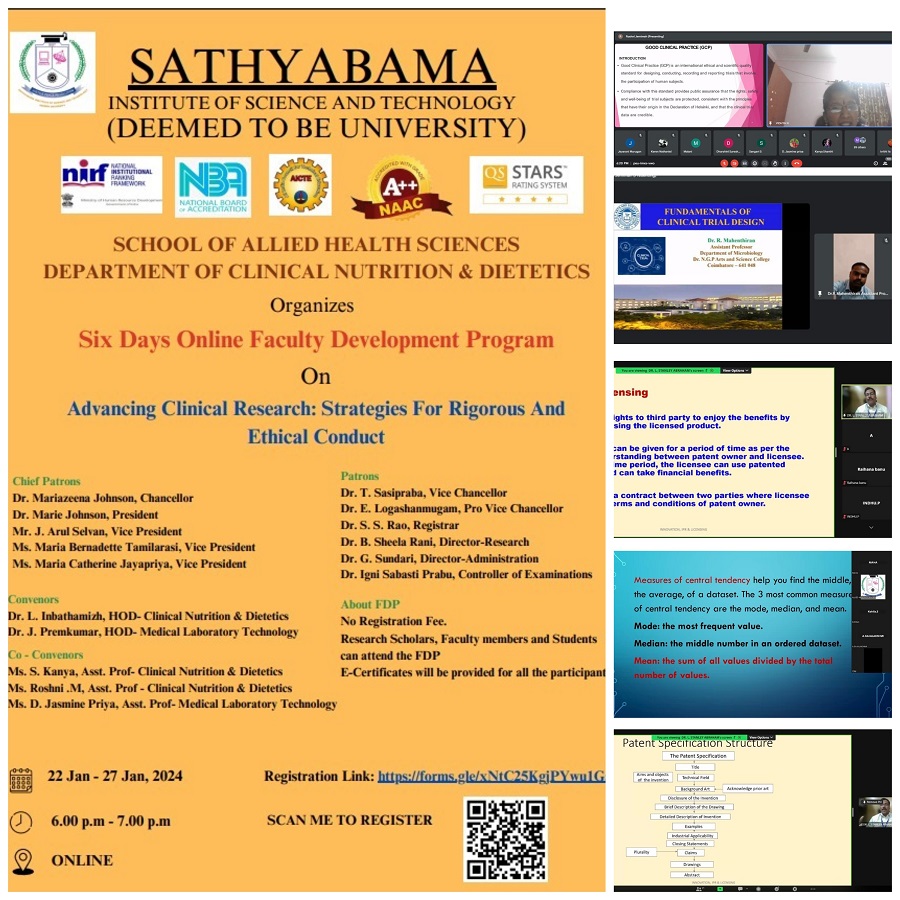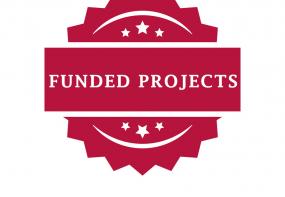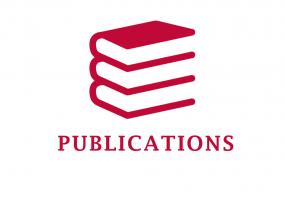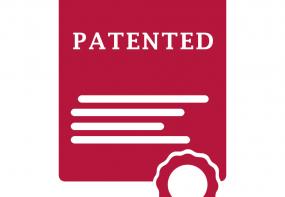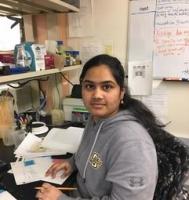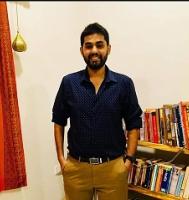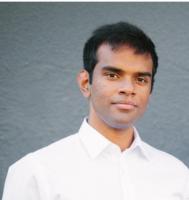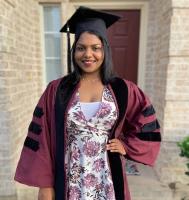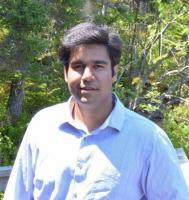School of Allied Health Sciences
Nutrition and Diet play a vital role in the promotion of health and well-being of an individual. A good and balanced diet can prevent diseases and improve the quality of life. Food habits of the current fast-moving world are influenced by the life style of the urban population. This has stimulated the significant role of nutritionists and dieticians who can suggest corrective food habits and nutritive diet based on an individual’s age, work routine, illness etc. Sathyabama Institute of Science and Technology captures the right thought of emphasizing the value of food and nutrition in combating diseases through the program B.Sc. Clinical Nutrition & Dietetics. This program provides knowledge on food production & processing, psychological factors influencing food choice, digestion and its effects on nutritional aspects, relation among food, human body metabolism and diseases. The program is planned in such a way that students not only get theoretical knowledge through classroom teaching but also focus on acquiring skills through practical training and project work. The demand for nutritional counselling in places such as hospitals, schools, prisons, armed forces, rehabilitation centres, gym, community health care agencies seem to increase with population and aging, so this course affords promising job opportunities in these domains. Sathyabama Institute of Science and Technology is one of its kind with the state-of-the art
infrastructure, well-qualified, committed and motivated faculty. This course is well-equipped with required laboratories. Hospital and clinical facilities for training are available within the campus to enhance practical skills. Field training in the assessment of clinical parameters, dietary, nutrient intakes, biochemical and pathological status, all constitute the essential components of the programs. To impart the in-depth knowledge to the students and keep abreast with the latest technology and developments, various events such as conferences, workshops, guest lectures, industrial visits and other events are organized regularly. Opportunities are abundant for students and faculty at all levels to participate in interdisciplinary and community-oriented projects and developmental activities.
Research
- Funded Projects
- Publications
- Patents
Several organizations, including the ICMR, DST, CSIR, UGC aid in encouraging faculty research in various domains of Allied Health Sciences through extramural funding. The grants also support the improvement of research facilities and foster a curiosity about research among the students.
Publications reflect the cutting-edge research being done. High-quality research publications in Allied Health Sciences have profound effect on health and society. They provide a platform for further collaborations and for inculcating the spirit of research among students.
Patents are the outcome of creative concepts and products. To address societal needs through new technology, innovation is needed. Patents validate and inspire the creativity and innovations among the faculty and students to bring out their unique ideas into action.
To create world class committed professionals in the fields of public health, dietetics, nutrition, and food science who can contribute meaningfully to the social, economic and health development of the country.
- To equip the students with the adequate knowledge, leadership and skills in Nutrition and Dietetics to provide professional services in a wide variety of settings including academic, governmental and community-based organizations.
- To update and enrich the academic program, expand the network with other institutions, establish national and international collaborations and explore all avenues for extension.
- To meet changing needs of society and industry in the areas of food and nutrition
- To promote positive nutrition practices through research and public education
- Impart knowledge and skills in the areas of Clinical Nutrition, Medical Nutrition Management, Diet Counselling, Meal Planning and Community Nutrition.
- Develop abilities that enable to pursue higher education and research in Clinical Nutrition and other innovations in the field.
- Demonstrate critical thinking abilities in order to assess and analyse, concepts,principles, research, clinical findings, and technologies in the nutritional sciences and evaluate outcomes in order to apply them to professional practice.
- Analyse, interpret, and respond to the major factors influencing healthcare delivery and healthcare policy.
• Apply the knowledge for recognizing the role of nutrition and food in the processes that lead to health and illness.
• Identify the problems in the areas of Nutrition and Dietetics that need attention and solution.
• Analyze data accurately to find solutions to challenging and complex dietary and nutritional issues.
• Apply scientific reasoning to the evaluation of nutrition information for use in food service, community, and clinical settings.
• Utilize modern tools and measures to compute the nutritional needs and ensure people, families, and communities on food access, preparation and safety.
• Prepare the professionals to function as responsible dieticians, nutritionists, educators and/or leaders in academic, government, clinical, or community healthcare settings.
• Describe social, multiethnic, and environmental dimensions within nutrition and the life sciences.
• Deliver cutting-edge nutrition care in interdisciplinary settings within the parameters of ethical, legal, and professional practice requirements, while collaborating with other healthcare practitioners.
• Function as an individual or as teams in various tasks in the corporate, medical, community, and institutional domains.
• Critique and effectively communicate nutrition information and employ nutrition guidance and counselling to individuals, collectives, and societies across all age ranges.
• Respond to the major factors influencing health and health-care policy with accountability, self-confidence and leadership skills.
• Engage in life-long learning to recognise the importance of independent study and possess the necessary skills to advance as a health and food science professional.
• To prepare outstanding professionals to assume major educational, leadership, and research positions as well as to provide career advancement opportunities in Nutrition & Dietetics.
• To develop an understanding of the concepts and skills associated with the delivery of nutritional care services and the interdisciplinary characteristics of the health care management professions.
• To gain experience of practical application of the knowledge and skills through various internships/trainings in the nutrition departments of a variety of health care agencies and organizations.
Insights
- Collaboration and MOU's
A MOU was signed with Deepam Hospitals on 22-09-2022 and Gleneagles Health City to foster opportunities for collaborative research, research consultancy, joint publications, guest lecture, industrial visits and internships.

Various Online Webinars and Inter-collegiate competitions were conducted to emphasis importance of healthy body & healthy mind among young population. Staff and students from different departments and different colleges participated in the events. Best submissions were congratulated and felicitated with e-certificates. A webinar was conducted on 12th July, 2022 to gain knowledge about the importance of oral health, risk factors of dental caries and the role of nutrition in managing oral hygiene and health Dr. Kiruthika gave her insights into the link between oral health and disease conditions. She also demonstrated brushing techniques and clarified few myths about oral hygiene.
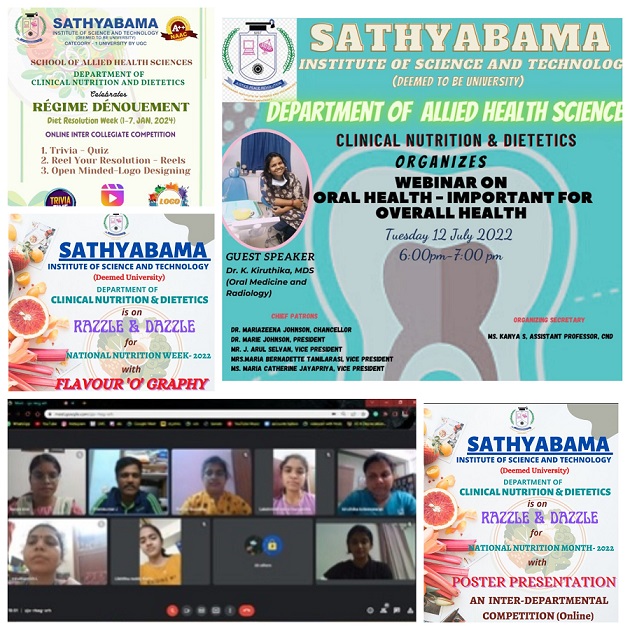
A puppet show was organised on 22nd July, 2022 to entertain & educate patients of Sathyabama Dental hospital. The show focused on the importance of Dental hygiene and its impact on Overall health. Healthy diet for maintaining oral health and 3D model brushing techniques were taught to the general public.
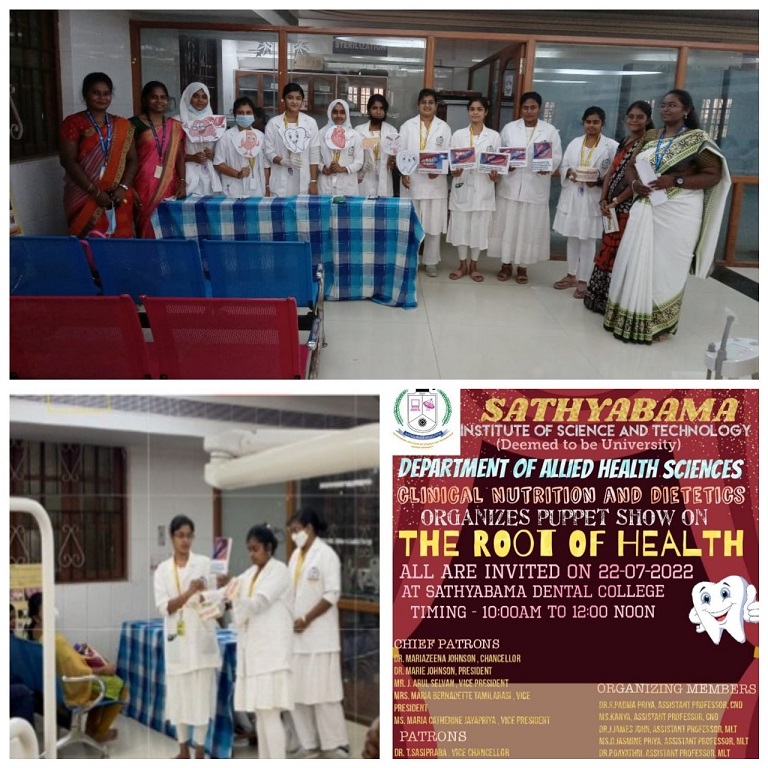
A Community programme was conducted on 4th August, 2022 at Urban Primary Health Care Centre, Shollinganallur on account of World Breastfeeding Week 2022, celebrating the vital importance of breastfeeding for both infants and mothers. The students organized educational activities and events to promote awareness and support for breastfeeding. These initiatives aimed to empower mothers with knowledge, dispel myths, and foster a supportive breastfeeding environment.
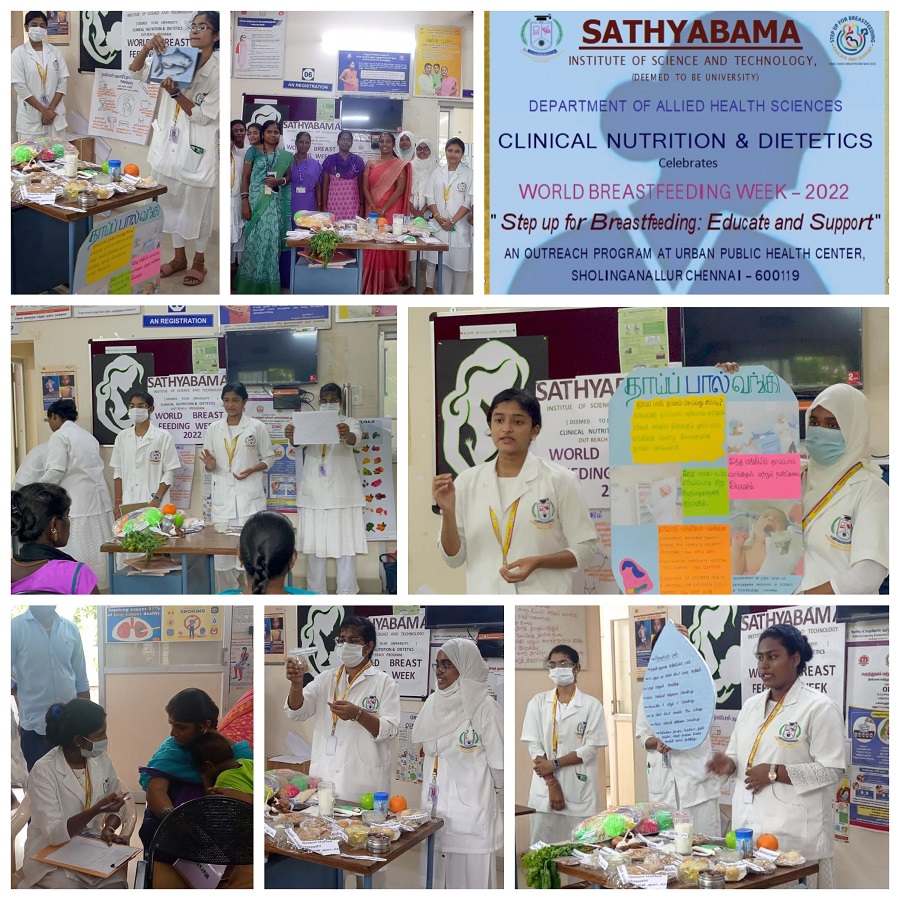
On the occasion of National Nutrition Month, the department celebrated EUTROPHIA on 28th and 29th September, 2022. The program focused on “Essence of Women’s Healthier Life”. Students emphasized the theme through rally, dance, music and exhibition. Intra-Departmental competitions such as Miss Healthier Sathyabama, Adds-up, Fireless cooking were conducted highlighting the concept.
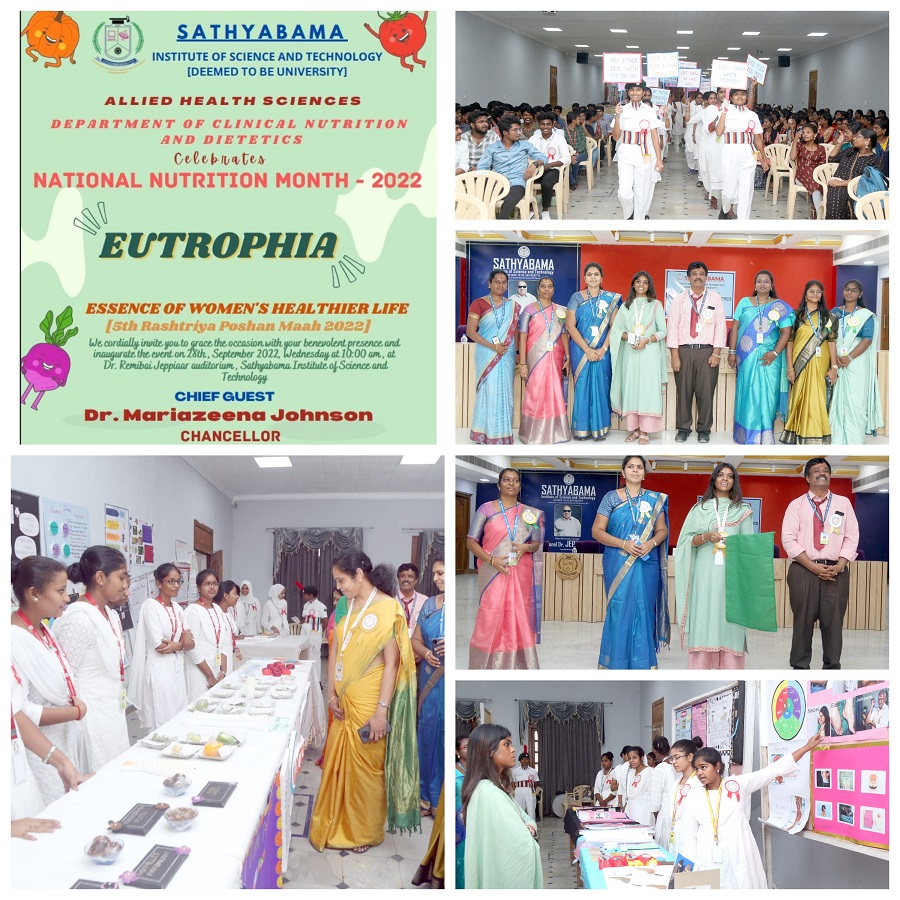
Commemorating the International Year of Millets 2023, the Department of Clinical Nutrition & Dietetics in association with the Department of Biotechnology jointly organized an Outreach Program “Health, Hygiene and Nutrition - A special focus on Millets” on 17th February, 2023 at Government High School, Karapakkam. Faculty and students of both the departments interacted with the school students around 300 from class 6th to class 9th. It was an awareness program along with activities and edutainment insisting the significance of health, hygiene and nutrition, and the multiple benefits of millets. The school students responded enthusiastically. The program provided a platform to inculcate the practice of using millets implementing the spirit of social responsibility among the budding generation.
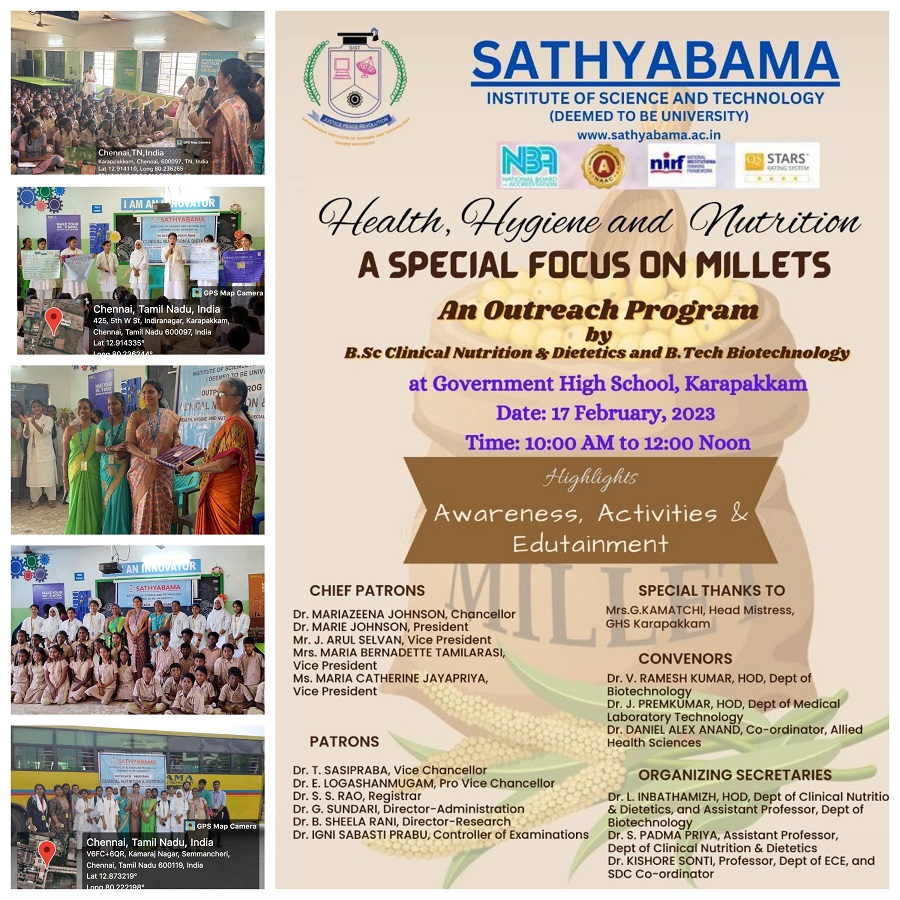
The Department of Clinical Nutrition and Dietetics and Medical Laboratory Technology jointly organised an outreach programme on 6th March, 2023 at Primary Health Centre, Semmancheri. The students from both the departments explained the importance of healthy snacking options, hydration and hygienic practices to the patients at the Centre.
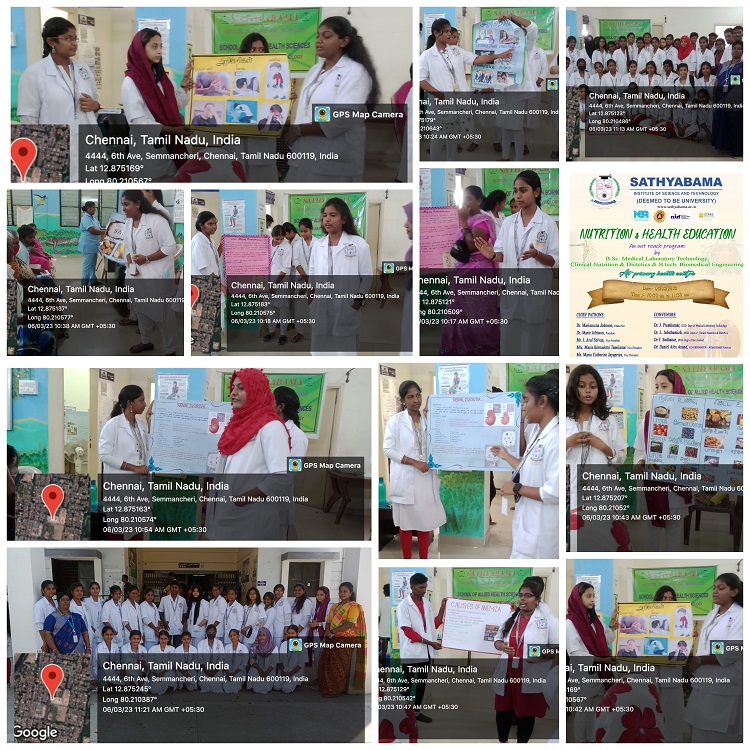
In view of World Women’s day, “World of Dancaholics” was conducted on 7th March, 2023 at Indoor Stadium. Zumba dance headed by the instructor Zin. Anjana was demonstrated on the theme “Women’s Health is her Capital”. Students participated enthusiastically.
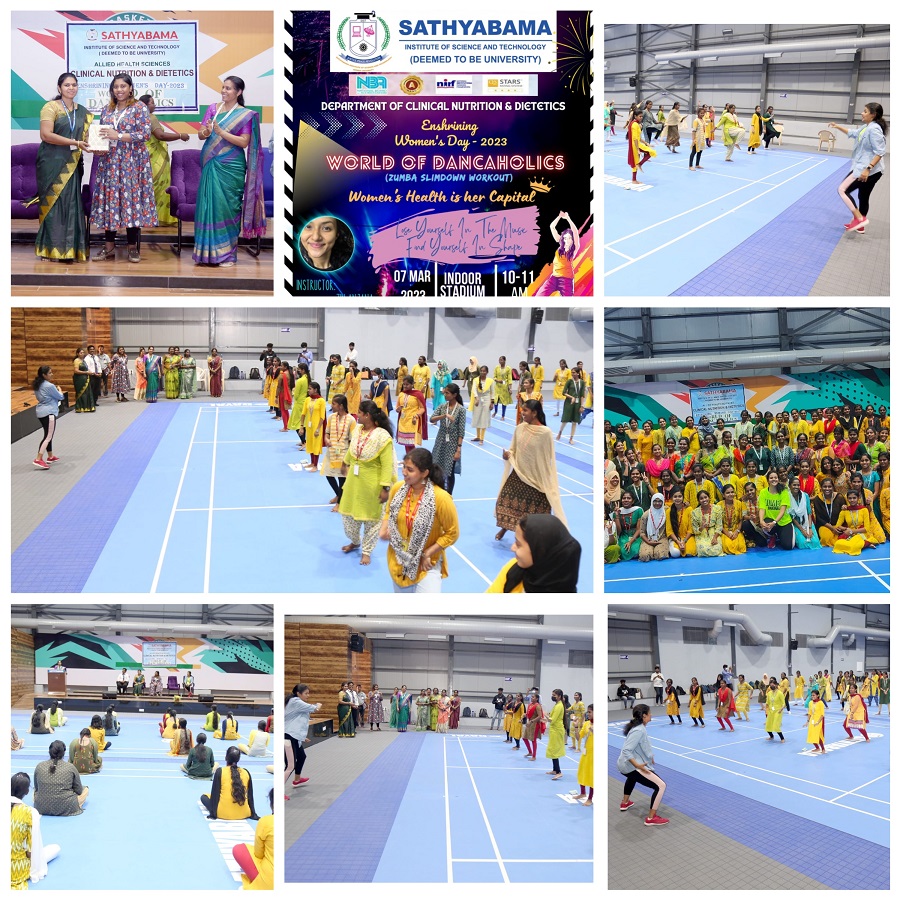
An awareness program was conducted on 10th March, 2023 at Indoor Stadium for all the Sathyabama bus drivers on account of World Heart Day. Students explained about various heart-related issues, causes, dietary guidelines and food items to be included & excluded for a healthy heart. Finally, the event was concluded by teaching a few yogas and Zumba dance steps for a healthy heart.
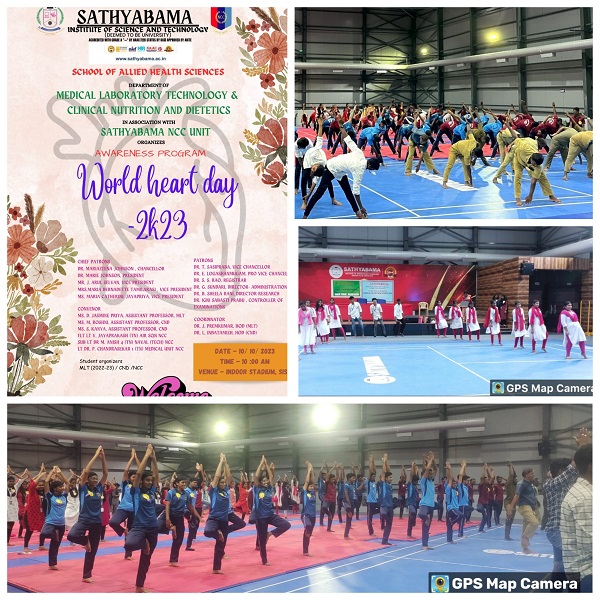
An inter-departmental program “Feast Fest 23” was conducted on 10th March, 2023, along with the department of Biotechnology. Students displayed models & Poster on Traditional Foods. Painting using natural pigments from fruits and vegetables, fireless cooking and vegetable carving competitions were conducted showcasing the extraordinary talent of students.
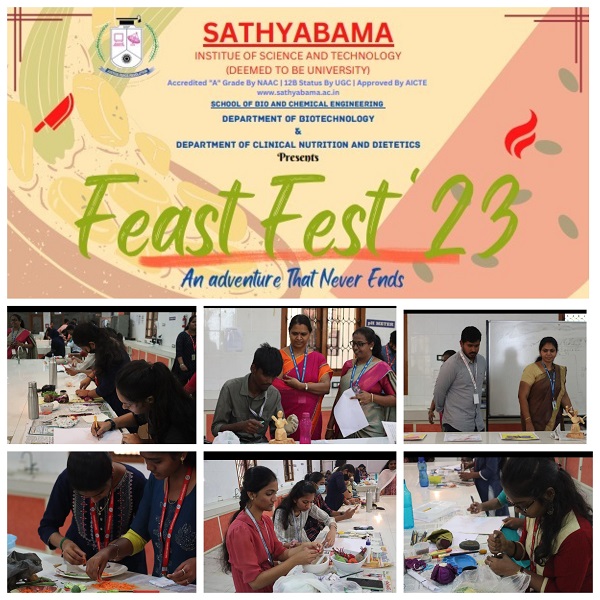
Students visited the Eco Kitchen at Injambakkam on 27th July, 2023. They explored a vast kitchen equipped to produce an enormous quantity of food daily. They witnessed the operations that provided valuable insights into large-scale food production, emphasizing the importance of incorporating sustainable practices in nutrition. The guide took the students to the Multipac steam boiler, where the heat for cooking is provided by the steam evolved in a separate chamber by the combustion of brigades composed of groundnut kernel, coconut shell, saw dust and jute waste. The visit broadened the students’ perspectives on the intersection of nutrition, sustainability, and community engagement.
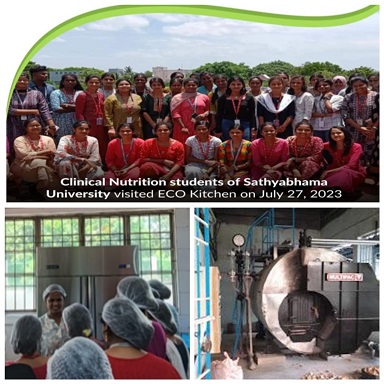
On account of World Hepatitis Day, a series of events were conducted on 28th July, 2023 by the department of Clinical Nutrition & Dietetics along with department of Biotechnology and department of Medical Laboratory Technology. The program started with an awareness rally on hepatitis and healthy liver, followed by a technical talk and skit, and finally concluded with the plantation of sapling.
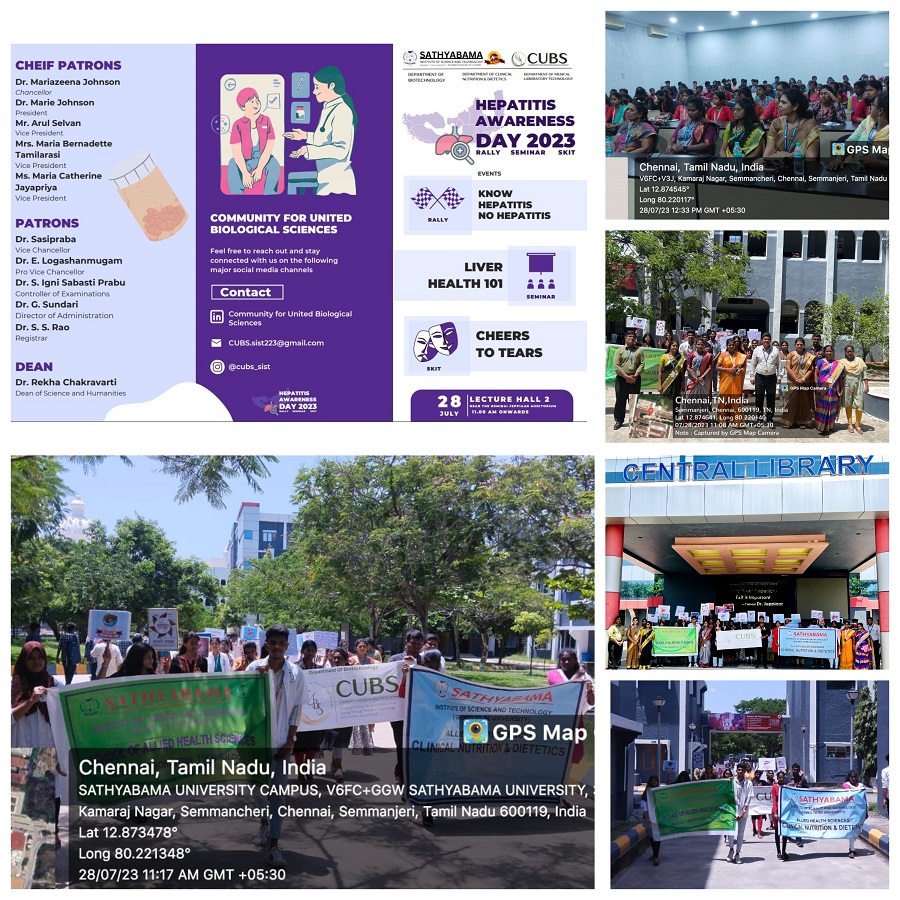
An outreach program was organized at Government Higher Secondary School, Sholinganallur, on 11th August, 2023, focusing on the theme “Feeding the Future - Empowering Youth through Nutrition”. The program covered the importance of drinking water, handwashing, hygiene, and more. Teaching aids, mimes, and interactive games were used to enhance the learning experience. Additionally, nutritious snacks were provided, reinforcing the message of choosing healthier alternatives over unhealthy junk food. The students’ active participation made a lasting impact, contributing to a well-informed and conscious future generation.
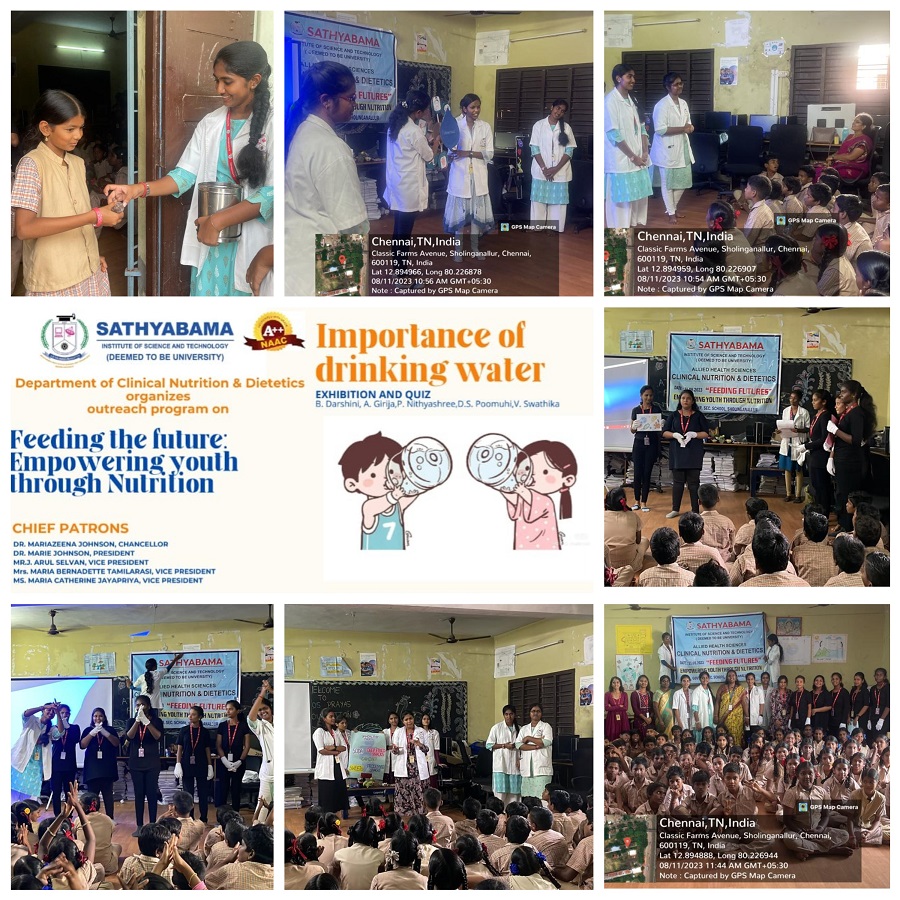
A guest talk on “The theoretical perspective and real time experience for a dietician – Bridging the gap” was delivered by Dr.P.Venkata Lakshmi, Chief Dietetician & HOD, Gleneagles Global Health City on 30th August, 2023. She discussed practical scenarios in a hospital setup. The speaker came up with lot of clinical conditions admitted in a hospital and role of dietician in handling them.
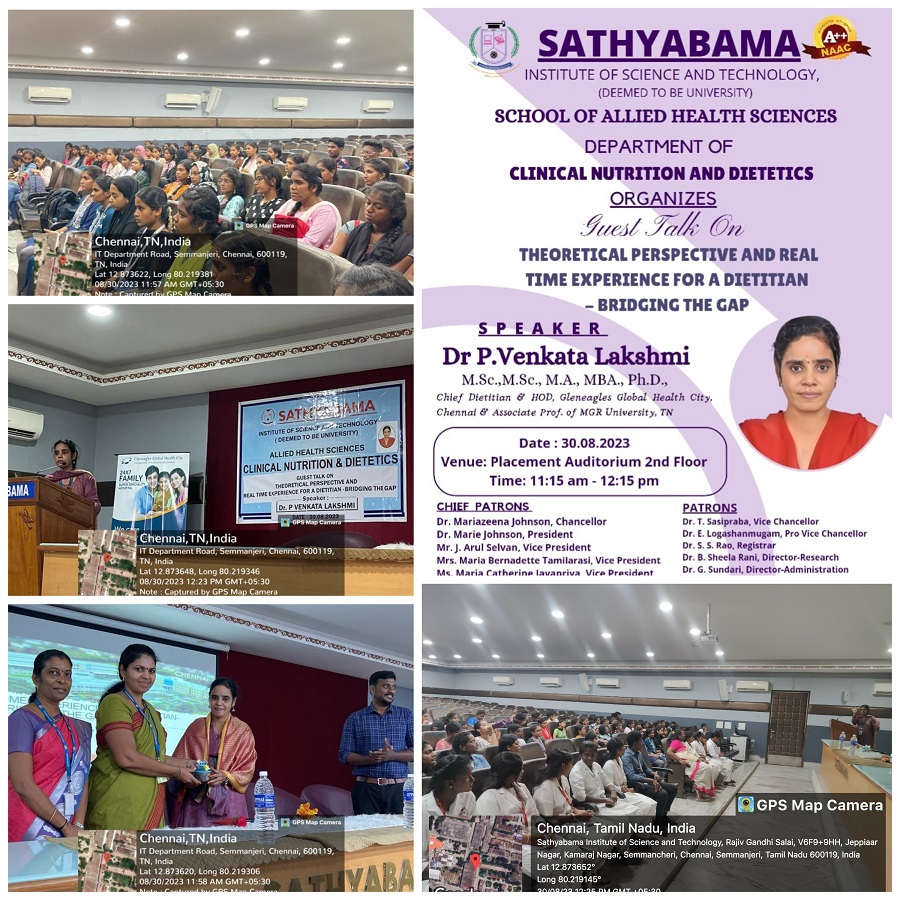
A one-day ice breaking workshop, “FUN with FOOD” was conducted for the students of I year Clinical Nutrition & Dietetics on 30th September, 2023, to explore variety of food groups and to understand the art of science behind each ingredient used in cooking. Numerous games and quiz were conducted to apply the chemistry of using the foods to formulate healthy meal for an individual.
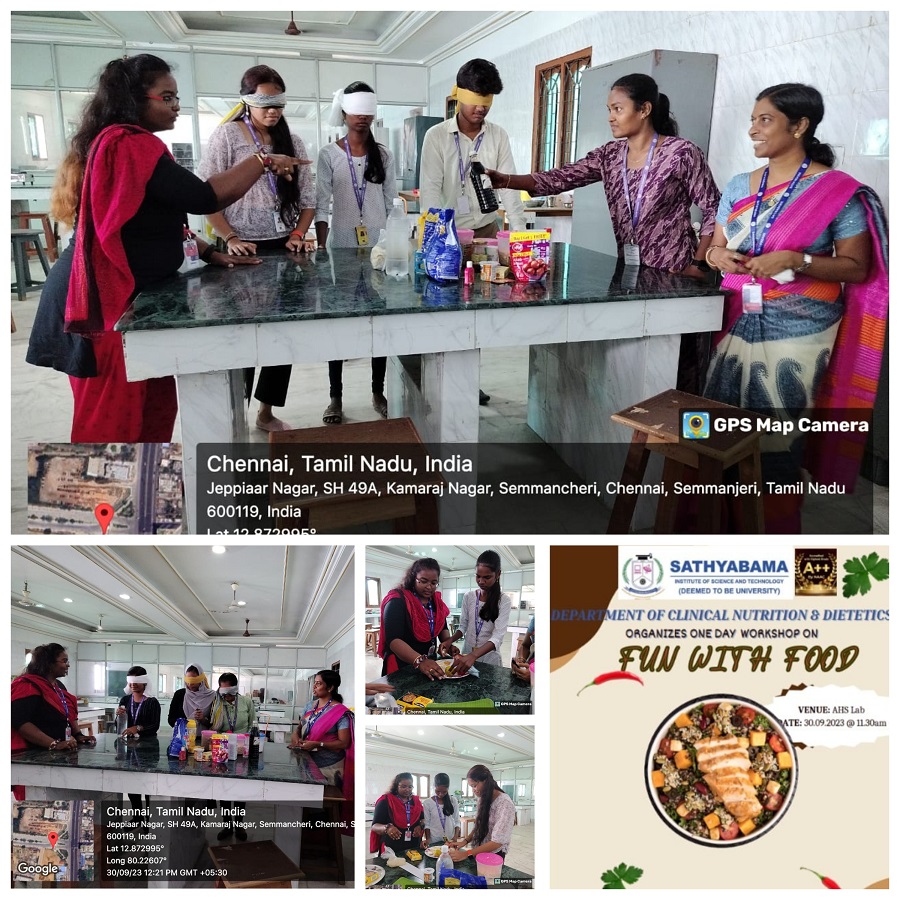
On the eve of World Food Day, an awareness program on “Water is Food, Water is Life: Leave no one behind” was conducted on 16th October, 2023. The students participated in numerous competitions conducted and created awareness on the importance of water.
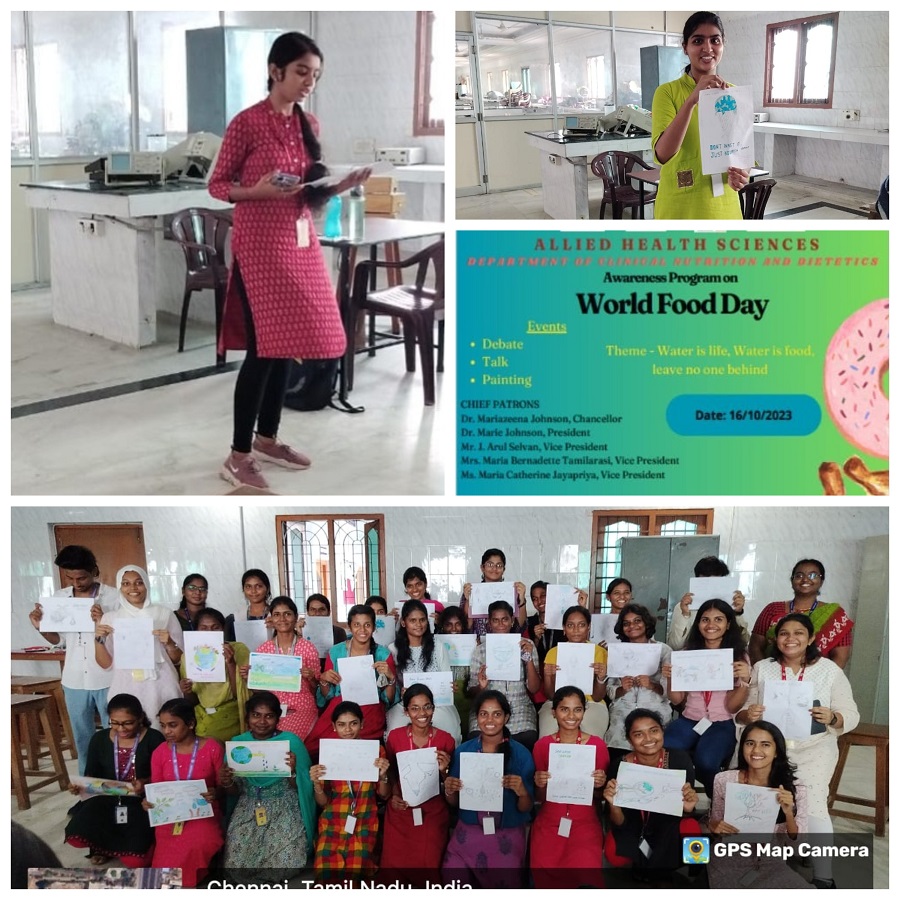
The Department organized a six-day online Faculty Development Program (FDP) entitled "Advancing Clinical Research: Strategies for Rigorous and Ethical Conduct," from 22nd to 27th January, 2024. The program featured distinguished speakers, including Dr. N. Vidya, Dr. R. Mahenthiran, Dr. Vijayanchali, Dr. S. Karthik Sundaram, Dr. Stanley Abraham, and Dr. K. Mahalakshmi, representing various institutes. The event garnered participation and appreciation from over 100 research scholars, faculty members, and students. The engaging presentations left a lasting impact, offering valuable insights to the participants in their academic and professional pursuits. The content covered a spectrum of topics, ranging from entrepreneurship and ethics to statistics and product development in the field of clinical research. In essence, the FDP proved to be a valuable forum for knowledge exchange and collaboration.
